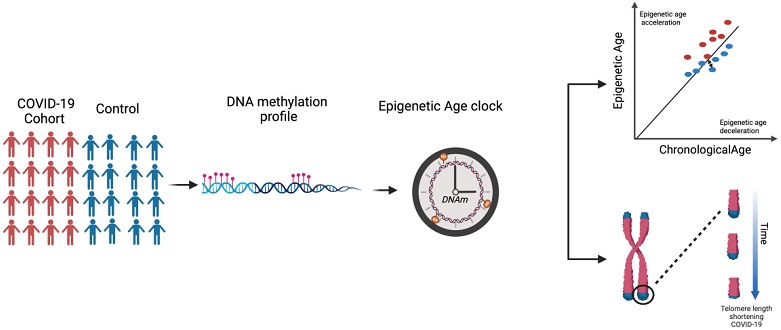Nikhil Prasad Fact checked by:Thailand Medical News Team Jun 10, 2024 1 year, 8 months, 3 days, 19 hours, 14 minutes ago
COVID-19 News: The COVID-19 pandemic has had an unprecedented global impact, not just in terms of immediate health consequences but also on long-term biological effects. One such effect is the acceleration of biological aging, a topic explored in a recent study review by researchers from Hamad Bin Khalifa University, Doha-Qatar that is covered in this
COVID-19 News report.
 COVID-19 Accelerates Biological Aging
Schematic summary of the review concept.
COVID-19 Accelerates Biological Aging
Schematic summary of the review concept.
The study review delves into how COVID-19 affects markers of biological aging, such as epigenetic age and telomere attrition, revealing the virus's deeper impact on human health.
Chronological vs. Biological Age
Aging is a natural process marked by the gradual decline of physiological functions. Traditionally, aging is measured chronologically, by the number of years a person has lived. However, chronological age (cAge) doesn't always accurately reflect an individual's health status. Biological age (bAge), which considers factors like lifestyle, comorbidities, and molecular changes, provides a more accurate picture of a person's aging process.
One significant biomarker of bAge is DNA methylation (DNAm), where a methyl group is added to DNA, affecting gene expression. Changes in DNAm at specific genome sites correlate with aging, leading to the development of "epigenetic clocks" that predict bAge. These clocks, including the Horvath, Hannum, PhenoAge, and GrimAge, use DNAm patterns to estimate bAge and potential health outcomes.
The Link Between COVID-19 and Aging
The review examines various studies investigating the relationship between COVID-19 and biological aging. Notably, it highlights the phenomenon of epigenetic age acceleration (EAA) in COVID-19 patients. EAA is observed when a person's bAge advances faster than their cAge. This acceleration has been linked to various diseases, including cancer and cardiovascular conditions.
Several studies have reported EAA in COVID-19 patients. For example, one study found that individuals recovering from COVID-19 showed an average biological age acceleration of over five years. Other research using epigenetic clocks confirmed significant DNAm age acceleration in both severe and non-severe COVID-19 cases. These findings suggest that COVID-19 might induce an accelerated aging process at the molecular level.
Telomere Attrition: Another Aging Marker
Telomeres, the protective caps at the ends of chromosomes, naturally shorten with age, leading to cellular aging and increased disease risk. The review highlights that COVID-19 patients often exhibit significant telomere shortening, especially those with severe disease. This attrition is associated with higher risks of critical outcomes, including ICU admission and death.
Several studies have demonstrated this link. For instance, COVID-19
survivors showed notable telomere shortening, and shorter telomeres were correlated with more severe disease symptoms. This connection underscores the potential of telomere length as a biomarker for COVID-19 severity and long-term health impacts.
COVID-19 and the Elderly: A Dangerous Combination
Age has been a critical factor in COVID-19 outcomes, with older adults facing higher risks of severe disease and mortality. This increased vulnerability is partly due to age-related declines in immune function, known as immunosenescence, and chronic inflammation, termed inflammaging. These changes weaken the body's ability to combat infections effectively.
Research has shown that elderly COVID-19 patients with comorbidities like cardiovascular, respiratory, and metabolic diseases are at an even higher risk of poor outcomes. The combination of advanced age and underlying health conditions creates a perfect storm for severe COVID-19 complications.
Gender and Ethnic Disparities
The review also touches on gender and ethnic disparities in COVID-19 outcomes. Studies have found that males are more susceptible to severe disease and higher mortality rates than females. This difference might be linked to biological factors such as telomere length, which tends to be longer in females, potentially offering them some protective effects.
Ethnicity also plays a role, with certain ethnic groups experiencing higher COVID-19 severity and mortality rates. These disparities highlight the need for tailored healthcare strategies to address the varying risks among different populations.
The Road Ahead: Future Research and Implications
While the current research provides valuable insights into the biological impact of COVID-19, it also reveals significant gaps. Most studies have focused on blood samples, which may not fully capture the virus's effects on other tissues. Future research should explore epigenetic changes in various tissues to validate these findings and improve our understanding of COVID-19's long-term consequences.
Standardizing the severity classification of COVID-19 cases will also enhance comparability between studies, leading to more robust conclusions. As the scientific community continues to investigate these issues, the development of epigenetic clocks as predictive tools for COVID-19 severity could revolutionize early disease management and improve patient outcomes.
Conclusion: Unveiling COVID-19's Long-term Impact
COVID-19's impact extends beyond immediate health effects, influencing the aging process at a biological level. The acceleration of biological aging and telomere attrition in COVID-19 patients, particularly those with severe cases, underscores the virus's profound and lasting impact. Understanding these changes is crucial for developing effective interventions and preparing for future pandemics. As research progresses, the insights gained will be invaluable in improving public health responses and mitigating the long-term effects of COVID-19.
The study findings were published in the peer reviewed journal: Frontiers in Immunology.
https://www.frontiersin.org/journals/immunology/articles/10.3389/fimmu.2024.1399676/full
For the latest
COVID-19 News, keep on logging to Thailand Medical News.
Read Also:
https://www.thailandmedical.news/news/mild-or-moderate-covid-19-causes-accelerated-brain-aging-especially-in-young-to-early-middle-aged-adults
https://www.thailandmedical.news/news/breaking-university-of-oxford-study-shockingly-finds-that-lungs-of-post-covid-19-individuals-displayed-premature-aging-of-more-than-15-years
https://www.thailandmedical.news/news/breaking-harvard-medical-school-study-alarmingly-finds-that-recovered-patients-of-severe-covid-19-undergo-premature-aging
